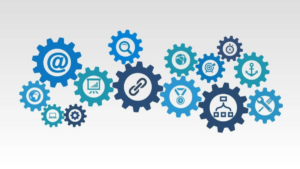As the coronavirus pandemic has quickly become the new normal, NDA wants to celebrate the positives of our current situation, to discover what people in the digital industry have to be cheerful about.
Richard Robinson, MD of Econsultancy
Disruptive innovation has been the byword of success for the past decade. Apps and services like Uber, Airbnb, Just Eat, Sina Weibo, Tinder and Netflix have been lauded for their disruption of legacy markets that were shaped by brand & business long before digital.
Within just a few short weeks the concept of disruption has begun to feel like yesterday’s news. Something quaint, akin to a minor interruption to big business and business as usual. The rules we understand are the disruptive force becomes big business, the market resets, normalcy returns.
What Covid-19 has created is the destruction of the rules, business as usual and even the concept of disruption itself. We have in effect entered a social experiment in radical digital transformation of how we work, how we produce and how business will survive and then thrive in the future.
With business as usual finished, business unusual must begin. There is no going back, there is only going forward. Today the velocity and immediacy of change is unprecedented. Absolute change is occurring on a daily, if not hourly, basis and the concept of time is being bent beyond all recognition.
Covid-years have become the new dog years, where one day of C-19 time is akin to seven days of 2019 time. There is no pause button or off switch, home-time, or perpetuation of the antiquated days of the 38-hour week where our forefathers and mothers worked from 9-5 for five days, as the unstoppable force of the 168-hour digital economy prevails.
With people consuming content and purchasing product whenever and however they like, 9-5 has blurred into 5-9 seven days a week, and no man, woman or child is willing to wait a second longer than necessary for the next dopamine-delivery from their new life of unrelenting ecommerce and online consumption.
On the one hand this could well be a downer, but on the other this form of modern-day natural selection and acceleration of our digital transformation shouldn’t come as a surprise to anyone. It’s been predicted and expected for well over a decade. So, let’s consider some of the many reasons to be cheerful.
What positive impacts have you seen on how your business operates?
For years we’ve defined effective digital transformation as 90% people and 10% tech, and for the first-time business is now fully focused on the 90%. The digital transformation of the people you work with and the customers you serve is not only exciting but essential if you are to survive, thrive and grow in our new online neo-liberal economy.
As a business famed for defining and applying excellence in digital marketing for the past 21 years, the past few weeks have seen a rapid understanding that time has finally been called on the digital laggards who are either unable or unwilling to pivot their business models to keep pace with the needs of the customer.
Rapid learning and upskilling in digital marketing based on best practice is now a critical commodity for every brand and business, those who learn fly — those who don’t fail.
Usage of Econsultancy.com has surged, but of most importance usage of EconLearn has exploded as people look to upskill their knowledge, skills and mindset for the new world. Our proven training methodology of Virtual Instructor-Led Learning based on a philosophy of Participatory Learning is in greater demand than ever before.
My antidote to business unusual is to lean in and learn, and my advice is to make sure you’re working for a business that values learning as a critical growth driver. Embrace learning, and it will be your salvation.
What have you been most heartened about in how your staff, partners, customers or clients have reacted to the new normal?
There are only two things I’ve ever claimed to be good at, connecting people and making things happen. They’re both instinctive and hard-wired into who I am as a person, and what I’ve enjoyed more than anything is watching an army of connectors, fixers, makers, doers, problem-solvers and sharers come together as one and get on with solving things that just a few weeks ago we’d never imagined.
Everyone is leaning into everything, everyone has become open source, everything has become virtually possible. I feel we have a new, collective, way of doing things built on learning and sharing, and this is great to be a part of.
What technologies have you been most impressed with during this new situation and do you think coronavirus will hasten their uptake or development?
I’m loving the rise of small-tech and narrow AI, the apps that can make an immediate difference to your individual problem. Guild for professional messaging, kind of like a GDPR-compliant WhatsApp for grown-ups, Whereby for easy click&go video calls, Loom for creating fast films & tutorials for others, Otter.ai for auto-typed meeting notes.
In parallel I’ve been heartened by Microsoft Teams finally finding its mojo and showing it does have a sense of humour with the recent roll-out of the Snap camera plugin. The business of business can be serious, but it’s nice to now have the choice of whether you want to play by the rules.
Closer to home I’ve been taken by how quickly Econsultancy’s clients have embraced the notion that the best virtual events are the same as the best real-world events, they’re human and founded on the principle of participation; so the more human and interactive we are, celebrating the shared experience and using tech as an enabler the greater the successes we see from our Virtual Instructor-led Workshops.
What, if any, positive long-term impact on the digital industry will coronavirus have?
The big winners of the next few years will be the ones who can mine the insights and map the customer journeys of millions of people no longer fettered by the analogue chains of legacy and memory.
The ability to quickly learn how to read and predict the behaviour of a new guard of B2C and B2B customers who are fully open to the possibility that digital brings to how they work, live, shop and communicate will generate a new wave of brands, agencies and practioners.
Within this, diversity of talent will become a critical success factor, because in an era where the rules of analogue legacy are no longer the rules of the game, business must move to a position where the people they hire are fully reflective of the moods, modes and personas of their current and future customers.
As a long-time advocate of progressive, fully inclusive, talent-management I have every confidence that Covid-19 will usher in more proactive, radical and wonderful approaches to how and who we hire, grow, teach and retain to be our next leaders.
What positive impacts on long term consumer behaviour shifts will the pandemic have?
The single greatest positive impact is the collective confidence that everyone is gaining from this shared experience. People’s minds are finally open to the possibility of digital in a way they never were before. The confidence people have to give things a go online, to lean in and learn, to play a part in upskilling their knowledge, skills and mindset in digital marketing and beyond is a joy to be a part of.
Youngers teaching Elders to use technology that just a month ago neither had heard of. Children and teachers enthusiastically embracing virtual classrooms, theatres sharing award-winning live productions on YouTube to new audiences, Milkmen and women becoming more relevant than ever as people relearn just how simple it is to get a 4am delivery from Milk&More.
Influencers trading in #FactNews becoming the new rockstars & prophets of the future, and all the while the invisible oxygen of WiFi quietly, methodically, confidently building a future that will be brighter than the past.
Lean in and learn people.





